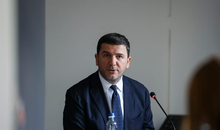
 Flash News
Flash News
Accident at "Shkalla e Tujanit", truck overturns in the middle of the road, driver injured
Vlora by-pass, work delays and cost increases
Milan are expected to give up on the transfer of Granit Xhaka
Inceneratori jashtë funksionit, përfshihet nga flakët fusha e mbetjeve në Elbasan
Accident on the Lezhë-Shëngjin axis, one injured
Germany will accept over 50,000 workers per year from the Western Balkans

Germany intends to allow over 50,000 unskilled workers from the Western Balkans to come to work in Germany in the future. This was approved by the German government on Wednesday (29.03.2023) as part of the new labor migration bill. The German Minister of Labour, Hubertus Heil, said at the press conference in Berlin that this contingent will be doubled from 25,000 which is currently a maximum of 50,000 people per year. But the minister added that there are plans to extend this regulation to other countries.
The Western Balkans Regulation has been in place since 2015 and allows citizens of the six BP countries (Albania, Bosnia-Herzegovina, Kosovo, North Macedonia, Montenegro and Serbia) privileged access to the German labor market, regardless of their qualifications. have.
A prerequisite for obtaining a work visa is a regular employment contract in Germany. No special knowledge of the German language is required either. The Western Balkans regulation is in force until the end of 2023, but in the new draft of the migration law, it is foreseen that it will be done indefinitely. According to DW sources, until December 31, 2022, there were about 62,000 immigrants with residence permits based on this regulation in the Central Foreigners' Registry (AZR).
Recognition of diplomas can also be done in Germany
But the draft presented by the German Minister of Labor and Social Affairs Hubertus Heil and the Minister of the Interior Nancy Faser also contains other innovations.
According to Minister Heil, foreigners from third countries will be offered three ways to come to Germany: through qualification, work experience and points system. The first existed even before, in the skilled labor migration law, which had entered into force before the pandemic. But the new draft of the center-left coalition has made some concessions:
So, for example, the minimum annual salary needed to obtain blue cards has been reduced: At the moment it is 49,581 euros, thus constituting 1.25 times the average gross annual salary in Germany. For young people and with less experience even under 40 thousand euros.
In addition, anyone who has graduated from a university or a professional school of at least two years has the right to come to Germany to look for work, even without having the qualification recognized in their homeland. The qualification recognition procedure has been one of the main obstacles so far for the arrival of skilled labor in Germany.
In addition, qualified persons will be allowed to work in any profession, regardless of their qualification.
As a qualification, not only the educational qualification will be called, also the work experience will play a role in the recognition of the qualification.
The points system or chance card, finally a reality
But the main innovation of this law, what makes the two social democratic ministers who presented the draft proud, is the points system, or the Chance Card.
Ngjashëm me sistemin kanadez të migrimit, Karta e Shanseve jep mundësi migrimi në Gjermani edhe në bazë të një sistemi pikësh bazuar në katër kritere: njohja e gjuhës, përvoja profesionale, mosha dhe lidhja me Gjermaninë.
Sipas draftit, mjaftojnë gjashtë pikë për të marrë një vizë njëvjeçare dhe për të kërkuar punë në Gjermani. Si mund të mblidhen ato?
Katër pikë për një kualifikim profesional.
Tri pikë për përvojën e punës
Tre pikë për njohuri të mira të gjermanishtes.
Dy pikë për njohuri të mjaftueshme të gjermanishtes
Dy pikë për moshën e re (nën 35-vjeçare) ose
Dy pikë për përvojë pune deri dy vjet.
Një pikë për lidhjet me Gjermaninë, pra, nëse ke qëndruar më parë në Gjermani për së paku gjashtë muaj.
Ministrja e Brendshme, Nancy Faeser, tha se me këtë kemi krijuar një ligj të ri modern migracioni. Faeser kritikoi qeverinë e mëparshme, kryesisht krahun konservator të saj, që e nuk e kishte lejuar ta realizonte këtë që më parë, por në vend të saj kishte jetuar me një siç e quajti ajo “gënjeshtrën e përhershme se Gjermania nuk qenka vend migrimi”.
Strategji për të luftuar mungesën e fuqisë punëtore
Projektligji i ri është pjesë e një strategjie të re të qeverisë për të përballuar mungesën e fuqisë punëtore, e cila tani po shqyrtohet nga komisionet përkatëse në Bundestag. Ai parashikon përveç shfrytëzimit te potencialit të fuqisë punëtore brenda vendit, duke rritur ofertat e trajnimeve profesionale për të rinjtë që lënë shkollën, përmirësuar kushtet e punës për nënat me fëmijë, apo duke rritur shanset për punësimin e refugjatëve apo azilkërkuesve të refuzuar.
Në një studim i Dhomave të Tregtisë dhe të Industrisë që u prezantua në mes të janarit në Berlin, Gjermania që tani ka 2 milionë vende pune të pazëna. Nga kjo mungesë punëtorësh ekonomia më e madhe e Evropës ka 100 miliardë euro më pak të ardhura kombëtare në vit. Situata përkeqësohet nga viti në vit:
Sipas projektligjit të ri të migracionit, përllogaritet që në bazë të këtyre ndryshimeve në Gjermani të vijnë mesatarisht deri në 75.000 vetë si fuqi punëtore e kualifikuar në vit. Këtyre u shtohet edhe kontingjenti i Ballkanit Perëndimor, me 50 mijë punëtorë në vit.
Për shumë ekspertë kjo shifër nuk i plotëson aspak nevojat e Gjermanisë për fuqi punëtore, Ekspertët përllogarisin se Gjermanisë i duhen 400.000 imigrantë të kualifikuar në vit.
Por ministri i Punës tha se nuk duhet harruar se pjesa më e madhe e fuqisë punëtore të kualifikuar vijnë nga vendet e BE-së, që nuk kanë nevojë për vizë pune. Numri i përgjithshëm i imigrantëve neto në vitin 2019 para pandemisë, ka qenë 350 mijë vetë.
On the one hand, due to the demographic map of the country: in the next 15 years, one third of the current employees will retire. But also due to structural changes caused by digitization, as well as changes due to the corona pandemic and the war in Ukraine./ DW
Latest news








Golem and Qerret without water at the peak of the tourist season
2025-07-01 21:09:32

Euractiv: Italy-Albania migrant deal faces biggest legal challenge yet
2025-07-01 20:53:38
BIRN: Brataj and Fevziu victims of a 'deepfake' on Facebook
2025-07-01 20:44:00

Vlora by-pass, work delays and cost increases
2025-07-01 20:24:29



Milan are expected to give up on the transfer of Granit Xhaka
2025-07-01 19:41:25


The silent but rapid fading of the towers' euphoria
2025-07-01 18:58:07
Donald Trump's daughter says 'goodbye' to June with photos from Vlora
2025-07-01 18:48:47

Tirana vote recount, Alimehmeti: CEC defended manipulation
2025-07-01 18:15:05

Left Flamurtari, striker signs with another Albanian club
2025-07-01 17:43:14
Accident on the Lezhë-Shëngjin axis, one injured
2025-07-01 17:19:35
June temperature records, Italy limits outdoor work
2025-07-01 17:03:15

Meet Kozeta Miliku, named one of the top five scientists in Canada
2025-07-01 16:32:12
"Arsonist" arrested for repeatedly setting fires in Vlora (NAME)
2025-07-01 16:29:45

The ecological integrity of the Vjosa River risks remaining on paper
2025-07-01 16:09:40
Heat Headache/ Causes, Symptoms and Measures You Should Take
2025-07-01 16:01:13
UN: The world must learn to live with heat waves
2025-07-01 15:54:50

Three cars collide in Tirana, one of them catches fire
2025-07-01 15:38:16

Shehu: Whoever doesn't want Berisha, doesn't want the opposition 'war'!
2025-07-01 15:19:20
Berisha requests the OSCE Assembly: Help my nation vote freely
2025-07-01 15:11:46
Be careful with medications: Some of them can harm your sex life
2025-07-01 15:00:32

'Golden Bullet'/ Lawyers leave the courtroom, Altin Ndoc's trial postponed again
2025-07-01 14:44:52
EU changes leadership, Kosovo in a number of places
2025-07-01 14:40:01
Should we drink a lot of water? Experts are surprised: You risk hyponatremia
2025-07-01 14:30:20



Lëpusha beyond Rama's postcards: A village that is being silently abandoned
2025-07-01 13:41:56
Scorching temperatures in France close the Eiffel Tower
2025-07-01 13:29:35
Media: China, Iran and North Korea, a threat to European security
2025-07-01 13:20:12
Albania drops in global index: Less calm, more insecure
2025-07-01 13:09:35
Road collapses, 5 villages in Martanesh risk being isolated
2025-07-01 13:03:04

Këlliçi: Opposition action to be decided in September
2025-07-01 12:48:49
Four tips for coping with the heat wave
2025-07-01 12:38:53
Car hits pedestrian on Transbalkan road
2025-07-01 12:27:09
Authors of 9 robberies, Erjon Sopoti and Abdullah Zyberi arrested
2025-07-01 12:15:56

He abused his minor daughter, this is a 36-year-old man in custody in Fier
2025-07-01 11:50:34
The constitution of the Kosovo Assembly fails for the 40th time
2025-07-01 11:40:08




EU confirms support for the Western Balkans
2025-07-01 10:50:45
Serious in Fier! Father sexually abuses his minor daughter
2025-07-01 10:32:33
One year since the passing of the colossus of Albanian literature, Ismail Kadare
2025-07-01 10:25:26


They supplied the 'spaçators' with drugs, two young men are arrested in Tirana
2025-07-01 09:54:09
Europe is "scorching", how dangerous are high temperatures?
2025-07-01 09:48:56


Nigel Farage in Albania: but why?
2025-07-01 09:13:12
Xama: The "Partizani" dossier is quite weak and without facts!
2025-07-01 09:04:47

Foreign exchange, the rate at which foreign currencies are sold and bought
2025-07-01 08:35:39
Fabricators again warn of factory closures and job cuts
2025-07-01 08:21:30
Horoscope, what do the stars have in store for you today?
2025-07-01 08:08:59
Scorching hot, temperatures reaching 40°C
2025-07-01 07:57:12
Morning Post/ In 2 lines: What mattered yesterday in Albania
2025-07-01 07:42:59
Recount after May 11, Braho: I had no expectations for massive vote trafficking
2025-06-30 22:54:18

Second hearing on the protected areas law, Zhupa: Unconstitutional and dangerous
2025-06-30 22:18:46



Israel-Iran conflict, Bushati: Albanians should be concerned
2025-06-30 21:32:42

Fuga: Journalism in Albania today in severe crisis
2025-06-30 21:07:11
"There is no room for panic"/ Moore: Serbia does not dare to attack Kosovo!
2025-06-30 20:49:53

Temperatures above 40 degrees, France closes nuclear plants and schools
2025-06-30 20:28:42
Lavrov: NATO is risking self-destruction with new military budget
2025-06-30 20:13:54
Turkey against the "Bektashi state" in Albania: Give up this idea!
2025-06-30 20:03:24

Accused of sexual abuse, producer Diddy awaits court decision
2025-06-30 19:40:44


